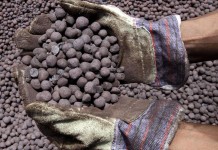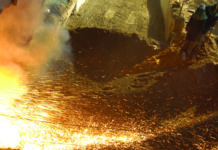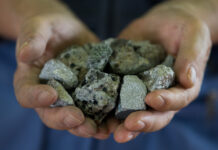
[miningmx.com] – ANGLO American has sold its 70% stake in the Amapa
iron ore mine, an operation in northern Brazil it acquired as part of its $5.5bn
purchase of the larger Minas-Rio deposit in 2008.
The mine, which Anglo has grown to 4.8 million tonnes of iron ore a year (Mtpa) from
1.2Mtpa when it first bought the asset, had been deemed non-core for some time as
the group wanted to focus on developing Minas-Rio.
Anglo said today that its 70% interest was sold to Zamin Ferrous, a privately-held
mining company. The terms of the transaction were confidential and were subject to
state regulatory approval, Anglo added.
In November, it was speculated four bidders, including Glencore International,
Russian steel producer Severstal, and Australia’s Centaurus, as well as Zamin
Ferrous, were in the running for the mine.
An internal valuation put Amapa’s value at $1.5bn, although the price of iron ore had
fallen significantly since the valuation was done, therefore the stake in Amapa would
be worth less than $1.5bn, Reuters said in November.
“Anglo American has always maintained that it does not envisage holding its interest
in Amapa over the long term and, in July 2012, reported that it had transferred
responsibility for Amapa to its Other Mining and Industrial business unit and stated
that it was exploring the possibility of divesting its interest,” Anglo said in its
announcement.
This leaves the UK group to focus fully on Minas-Rio, a mine dogged by capital
overruns and timeline slippages that commentators have said contributed towards
the resignation of Anglo CEO, Cynthia Carroll in October.
In November, Anglo said its board had commissioned an independent, external study
into Minas Rio which had seen its forecast capital programme balloon from an
estimated $3.6bn in 2009 to $5.8bn earlier this year, to a minimum of $8bn today.
Much of Minas Rio’s problems related to permitting with the last outstanding
injunction – blocking building of an electricity transmission line – lifted by the Brazilian
authorities on December 21.











